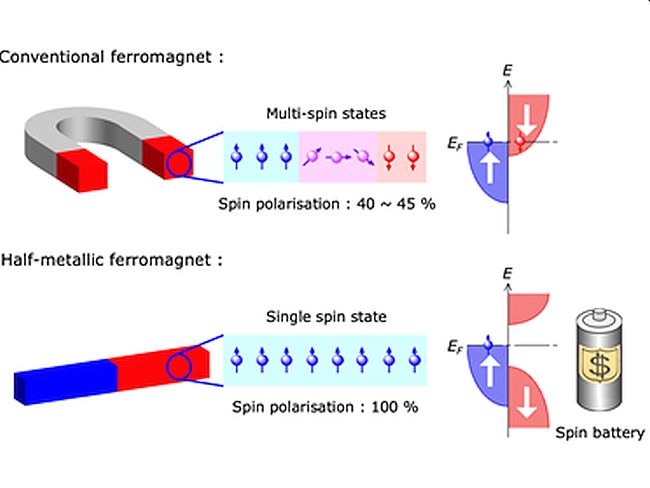|
|
|
|
|
|
| A review on the latest research of the various types of Heusler alloys summarizes the field's main achievements up to 2020. |
TSUKUBA, Japan, Mar 30, 2021 - (ACN Newswire) - A study published in the journal Science and Technology of Advanced Materials summarizes the major achievements made to-date in Heusler alloy research. "Our review article can serve as an ideal reference for researchers in magnetic materials," says Atsufumi Hirohata of the University of York, UK, who specializes in spintronics.
 | | Spin 'batteries' use electron spins, instead of their charge, to power spintronic devices. |
Spintronics, also known as spin electronics, is a field of applied physics that studies the use of electron spins, instead of their charge, to carry information in solid-state devices, with reduction in power consumption and improvements in memory and processing capabilities.
A category of materials showing great promise in this area is Heusler alloys: materials formed of one or two parts metal X, one part metal Y, and one part metal Z, each coming from a distinct part of the periodic table of elements. The interesting thing about these alloys is that individually, the metals are not magnetic, but when combined, they become magnetic.
A major advantage of Heusler alloys for spintronic devices is the ability to control their unique electrical and magnetic properties, which result directly from electron spins, by making changes to their crystalline structures. But this requires very high temperatures, which researchers want to reduce.
Over the last few decades, scientists have been working on approaches to grow Heusler alloy films at room temperature on special substrates with crystal lattices that are similar to the alloy's. The interaction between the two lattices can lead to the development of half-metallicity in the Heusler alloy, where only electrons spinning in one orientation are conducted through the material whereas those spinning in another are not.
Researchers need to be able to measure the properties of materials in order to conduct their investigations. The atomic structure of Heusler alloys can be directly observed by X-ray diffraction and indirectly measured through examining the relationship between the material's resistance to an electric current and temperature changes. Other techniques are also available for measuring their magnetic properties.
Hirohata and his colleagues are currently working on fabricating a metallic magnetic junction made of Heusler alloy films. These junctions are made from two ferromagnets separated by a thin insulator. When the insulating layer is thin enough, electrons are able to tunnel from one ferromagnet to the other. There is low resistance to electron movement as long as an external magnetic field is applied, but as soon as it is removed, the material becomes highly resistant to electron movement. "These devices are expected to replace currently used memory cells and magnetic sensors," says Hirohata. The team hopes to develop metallic magnetic junctions with much larger magnetoresistance than the current record at room temperature, realising a next-generation memory for a sustainable society.
Research paper: https://www.tandfonline.com/doi/full/10.1080/14686996.2020.1812364
Further information
Atsufumi Hirohata
University of York
Email: atsufumi.hirohata@york.ac.uk
About Science and Technology of Advanced Materials Journal
Open access journal STAM publishes outstanding research articles across all aspects of materials science, including functional and structural materials, theoretical analyses, and properties of materials.
Chikashi Nishimura
STAM Publishing Director
Email: NISHIMURA.Chikashi@nims.go.jp
Press release distributed by ResearchSEA for Science and Technology of Advanced Materials.
Topic: Press release summary
Source: Science and Technology of Advanced Materials
Sectors: Electronics, Materials & Nanotech, Alternative Energy
http://www.acnnewswire.com
From the Asia Corporate News Network
Copyright © 2026 ACN Newswire. All rights reserved. A division of Asia Corporate News Network.
|
|
|

|
|
|
|
| Science and Technology of Advanced Materials |
| July 8, 2025 06:48 HKT/SGT |
|
Progress towards potassium-ion batteries |
| June 23, 2025 00:15 HKT/SGT |
|
New method to blend functions for soft electronics |
| May 5, 2025 03:20 HKT/SGT |
|
New Database of Materials Accelerates Electronics Innovation |
| Jan 28, 2025 08:00 HKT/SGT |
|
High-brilliance radiation quickly finds the best composition for half-metal alloys |
| Dec 3, 2024 23:15 HKT/SGT |
|
Machine learning used to optimise polymer production |
| Oct 25, 2024 23:00 HKT/SGT |
|
Machine learning can predict the mechanical properties of polymers |
| July 30, 2024 20:00 HKT/SGT |
|
Dual-action therapy shows promise against aggressive oral cancer |
| Apr 17, 2024 22:00 HKT/SGT |
|
A new spin on materials analysis |
| Apr 12, 2024 18:00 HKT/SGT |
|
Kirigami hydrogels rise from cellulose film |
| Feb 27, 2024 08:00 HKT/SGT |
|
Sensing structure without touching |
| More news >> |
 |
|
|